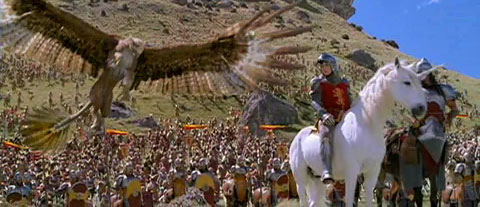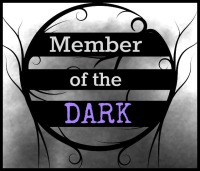
Chronicles of Narnia
This theme is probably going to be very similar to the City Guards week from December, but that isn’t surprising. Guards and soldiers get used interchangeably in a lot of fiction because they are part of the setting. The nameless warriors who are there to either be in the background, push the heroes to the next plot point, or be taken out in a scene to show how powerful/evil the villain is. Yet, there is one subtle difference between the two that drives me to do a week for the military characters. So, what am I talking about?
That would be location. City guards are in the city and that’s where they tend to stay. It’s in the name and they are closer to police than soldiers at times. While still working for the same kingdom, soldiers are more prone to traveling away from the city. They patrol the wilderness instead of the streets and march to war when necessary. You tend to have larger armies than guard forces too because this is where the true might of a nation will be displayed. Gear might differ as well because guards need to chase criminals while soldiers need to clash with their charging enemies. This could mean the military has stronger armor, heavier weapons, and more advanced technology such as catapults. Not that different from the real world.
Even with all of that, guards and soldiers tend to get the same roles. Unless they are going to join the main or supporting cast, these guys are nameless victims of the story. You do get a grander scale with armies though. Think about how often you see two opposing forces crash together like tidal waves of bodies and metal. It sets a chaotic and bloody scene for the heroes to work within, but it doesn’t do anything to develop the armies beyond ‘the fight and die’. We really do rate battle scenes on the enormity of the forces and the brutality of the fighting, which really drives home the idea that these nameless characters are fodder. Heck, I remember ‘Game of Thrones’ gloating in December about one of the final episodes having ‘the biggest battle ever shown in a TV show’. That tends to mean a lot of soldiers on the screen with no reason to be there other than fighting and dying.
It’s not the deepest role and it is kind of sad since any character who steps out of the army to be more than scenery loses something. They may still be a soldier, but they aren’t part of an army for the most part. At the very best, they are acting as a representative of that nation for the sake of the story. It’s not that easy to do the jump either. Those with high rank would come off as odd if they’re taking orders from the main hero, so they might create tension in the cast. Those of lower rank might require more orders and fall further into the background until they become something else. I’m not saying it’s impossible, but it is a challenge for a fantasy author, especially if the story involves adventuring. The life of an adventurer is one that doesn’t always follow the rules, which is the opposite of the law-abiding soldier.
Have you ever used a military character in your story? What were some of the challenges?





A thought-provoking post! It really made me think about how different characters–particularly these tertiary, almost background characters–are used. I tend to use men and women as city guards or soldiers. As you mentioned, I use them interchangeably. It really depends on the story. In a time of peace the ones I emphasize are the guards who take turns at the guard posts of a walled city. Whenever I’ve mentioned a soldier that person is usually ex-military, but still in a leadership capacity in some form. I have written scenes where a “red shirt” soldier has been killed by the main antagonist of the book. But at least the “red shirt” had a couple of lines of dialogue.
LikeLiked by 1 person
It’s hard to give the background characters even one line. Especially fantasy soldiers because of how often large battles are used.
LikeLiked by 1 person
Yes. The Battle of the Pelennor Fields could only involve so many speaking parts. 😀
LikeLike
They shouted, right? It counts as being part of the chorus.
LikeLike
As you point out, military characters require some particular dialog and customs. Takes research to get it right. Thanks, Charles.
LikeLiked by 2 people
The research is always tricky.
LikeLike
It does indeed!
LikeLike
Reblogged this on Chris The Story Reading Ape's Blog.
LikeLiked by 1 person
Thanks. 😁
LikeLiked by 1 person
Welcome, Charles – interesting post 👍😃
LikeLike
Ah, the city guard… proverbial ‘red shirts’ of the fantasy scene 🙂
LikeLiked by 1 person
Sad, but true.
LikeLiked by 1 person
Thanks for noting the difference between the two groups. I think we sometimes forget with our nameless cast that there are nuances to their roles.
Your last paragraph is where the most interest lies. Sometimes when someone breaks out of anonymity, it is to die. But the other two options you posited leave room for interesting dynamics. You can do a lot of plot and character development when an experienced colonel has to take orders from a new and inexperienced king. And the character arc of a young, untested soldier rising to hero status is the stuff epic fantasies are made of.
You’ve given me a lot to think about. I’m not currently writing a fantasy (I’m working on a sci-fi series), but these concepts are transferrable. And I’m getting ideas…
LikeLiked by 1 person
Glad to be of help. That last paragraph was born from remembering one of my favorite video games. Final Fantasy 9 has a character named Steiner. He is a soldier going after the thief protagonist at the start and eventually joins the group. It’s a good example of taking a rule following character getting more flexible without losing his original charm.
LikeLiked by 1 person
Reblogged this on Author Don Massenzio and commented:
Check out this post from Charles Yallowitz’s Legends of Windemere blog with the topic: Fantasy Armies: Popular Tools of the Trade
LikeLiked by 1 person
Thanks for sharing.
LikeLiked by 1 person
You’re welcome.
LikeLike
There is order on a pirate vessel, even if they aren’t military. I included a few military types, but they didn’t amount to a whole lot in the grand scheme of my story. I’ve written former military men. Never dived too deep into the foot soldier character, but it could be fun one day.
LikeLiked by 1 person
Weren’t some pirates former military men? Might be getting fiction and reality mixed up there.
LikeLiked by 1 person
All walks of life. I had a plan for a story about the bucket brigade who clean up bodies. I kind of parked it because WWII has kind of been done enough.
LikeLike
Seems to always be room for a new twist on WWII.
LikeLiked by 1 person
Maybe. Of course in one of my stories there would be a paranormal element.
LikeLike
Always a fun twist. 😁
LikeLiked by 1 person
You’ve hit upon a curse of mine. I am not a military person, and nor do I engage in the idolatry that’s so common around military service. Yet so often my characters are soldiers! I have no idea how to write that part of their lives, although fortunately I have friends who will give me feedback.
LikeLiked by 1 person
Research and friends with those experiences help out a lot. I think learning about military life is fairly easy since there’s so much out there.
LikeLike
Pingback: Seven Links 2/23/19 Traci Kenworth – Where Genres Collide